How crisis can fast-track business transformation
![{[downloads[language].preview]}](https://www.rolandberger.com/publications/publication_image/TA_32_001_EN_Cover_download_preview.jpg)
Think:Act Magazine explores how successful companies face the challenges of our time with creativity and agility to enter a New World.
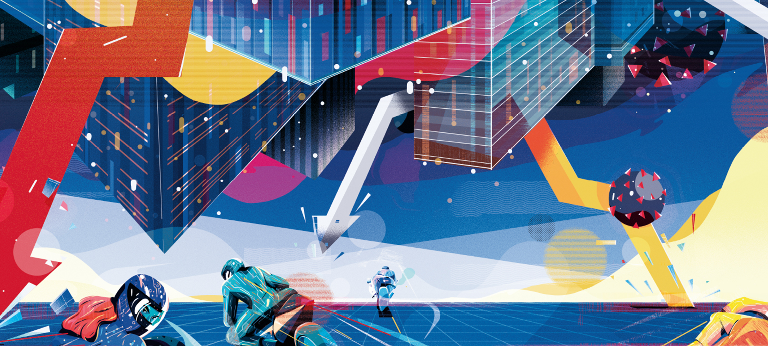


by Bennett Voyles
Illustrations by Joe Waldron and Joe McKendry
Consolidation and slow-paced long-term planning are out. What do you need to be thinking about to get ready for the post-pandemic-era? Read on for some expert opinions on what could shape the future of business.
Something has definitely changed. For many commentators, the change is so great that they say things will never be the same again. Covid-19 has torn through countries and businesses, devastating some and threatening others. After weeks and months of lockdown, disrupted supply chains, inhibited consumerism and frustrated social interaction, a zeitgeist is emerging around how to engage with a brave new world – how to face tomorrow. And it's pointing towards acceleration: What some companies thought might take five or 20 years is now being achieved in a few months, even weeks.
Acceleration can drive transformation, changing our assumptions about what works. With it comes the need to reassess. Even reset. There is a consensus emerging that companies will have to work in very different ways compared to how they did prior to this "black swan" event. As Sir Cary Cooper puts it: "We're not going back to the same world we came out of." Who you are, what you sell, how you sell – and maybe even why you sell – are all up for a fundamental rethink.
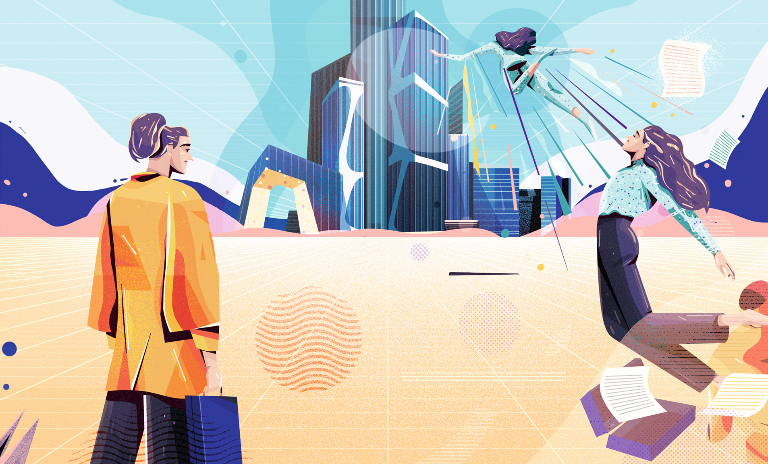
Senior executives have had the toughest of times and experienced something that large organizations abhor: a number of surprises in quick succession. Some of them have been dramatic and relentless. The deepest recession since the Great Depression has been coupled with a moral and often legal obligation to adopt an ever-evolving list of new hygiene rules. Add to that the most serious race protests in the US and around the world since the 1960s, and the foundational principles of business seem to be shifting. There is scope to think that new rules, assumptions and a rethink of everything you thought you knew are all up for grabs. As the chorus sang in the last act of Hamilton, the successful hip hop musical about the American revolutionary, it's clear that we live in a world turned upside down.
is a professor of business administration and Batten Institute executive-inresidence at the University of Virginia’s Darden School of Business.
This necessitates new ways of thinking within a rapidly changing landscape. The companies that succeed will be those that adapt quickly, like Disney, which abandoned pre-corona plans for a theatrical release of its $79 million filmed version of Hamilton, and released it direct-to-stream on July 3 to spur subscriptions to its Disney+ service. For Edward D. Hess, the change is more like the challenge faced by our prehistoric ancestors after the rainforest dried up and they had to adapt to life on the savannah. Perhaps we don't have to go that far back for an analogy, though. Carl Benedikt Frey has studied consumer behavior in the aftermath of the Spanish flu of 1918. "Something you see from after the 1918 pandemic is that in the places that were most badly affected and where a lot of people died from the virus, you see persistent declines in social trust and interactions," he says.
While some people – as many as 90% – will act as if things are back to normal, if 10% stay home, it's still a shift that will drive huge changes in society, the economy and business. Even in normal times, such shifts are extremely difficult. "Companies are run by plans and operating manuals," says Jagdish Sheth. But now, suddenly, many of the old rules don't apply, and executives face an enormous challenge. Instead, Sheth thinks "leaders and managers need to learn how to improvise." A new ecosystem, then, with new threats – but new opportunities too.
"Clearly digital transformation has moved way up on the agenda."
is a strategic management scholar, professor of management at Columbia Business School, and author of "Seeing Around Corners: How to Spot Inflection Points in Business Before They Happen."
In a quip about Oakland, California – "there is no there there" – the novelist Gertrude Stein said something that's now equally true for business: The virtual is fast becoming the core of every enterprise, whatever business you are in. For safety, convenience and cost-saving, a cloud-based platform is now a prerequisite for facing the years ahead. "Clearly digital transformation has moved way up on the agenda," says Rita Gunther McGrath . "Things that were on the 3-5 years plan are on the 12-18 month plan ... because businesses have no choice. They have to operate in a different way."
Many business thinkers are now arguing that beyond enabling companies to better streamline their enterprise resource management, a digital backbone makes it possible for them to take advantage of the streams of data at every stage of business operations and give workers the tools they need to work remotely and then reinvent themselves faster.
Some companies' business models have already become more virtual during the lockdown. Retailers, for instance, are now operating in a world where e-commerce is rapidly becoming the dominant sales channel. In the pre-coronavirus era, virtual shopping was discretionary and physical shopping was primarily for groceries and other day-to-day types of purchases.
That has changed now, with more reliance on online ordering and delivery. Going to the store is becoming a novelty, Sheth argues, as consumers have learned over the past months to order more of their staple products online. Services too, particularly medical services, are also moving increasingly online – and that’s a good thing. "Why should I go to the service provider? A virtual appointment saves both of us cost and time," Sheth says. Service providers should think how they can translate as much as possible to the virtual sphere.
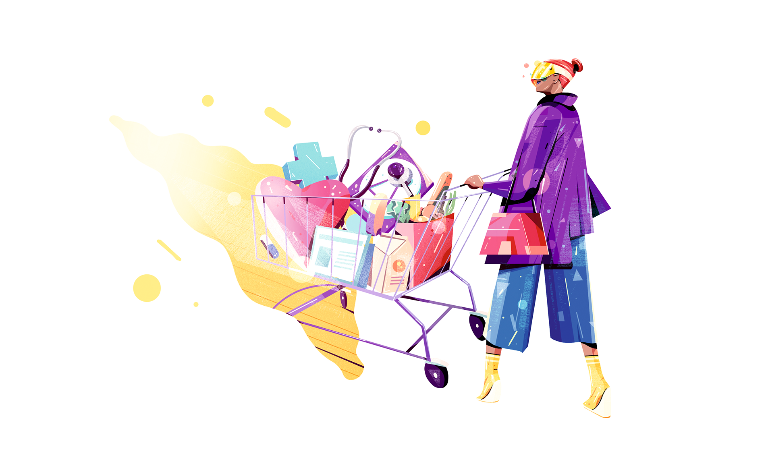
The aftermath of the Covid-19 pandemic will mean different things to different people in different places, speculates Steve Blank. Older people may not want to fly; younger people may not want to stay home. In the US, people in different parts of the country may also respond differently, depending on how severe the outbreak was near them.
For the near future, Blank argues, marketers trying to reach consumers will need to take a narrower approach. It is both an instinctive reaction and a gut understanding that the rules of the game have fundamentally changed and are now in the course of being rewritten. "We just ran a science experiment that accelerated remote everything by more than 10 years," says Blank reflecting on the rapid changes the pandemic has forced on our systems.
Blank thinks a takeaway is that video calls are not only a reasonable substitute for in-person meetings, but for some uses, such as market assessments, they may be even better. "I would say to everyone: All your first meetings should be online. It's not a replacement for a discovery period but boy, don't waste your time driving places."
While video calls aren't perfect, they're good enough, and a much more cost- and time-effective way to begin a sales conversation. But deeper online discussions may remain challenging for a while yet. "A big percentage of the cues we get from meetings in person, whether they're business meetings or social, are all the unconscious physical cues, non-verbal cues that as human beings, we're wired to understand," Blank says.
Non-verbal cues are also environmental. "You put that in conjunction with where we're meeting – is it a strip mall or is it a great conference room on the 47th floor? What are people wearing? And there are also some theories about pheromones and smells as well – all those cues are gone." People are also working at overcoming that hurdle and Blank is sure that the limitations will create new opportunities for companies to develop tools that can extract more information from a video call. Blank predicts software packages that interpret facial expressions will be popular and should reach the market relatively soon, given facial expression reading software exists but is yet to be applied to videoconferencing.
"I would say to everyone: All your first meetings should be online."
is a Silicon Valley entrepreneur and co-founder of the Lean Startup movement
This all means new rules – and that, of course, means new roles. Managers are increasingly seeing their systems being run by other means, and therefore they need to put more time into their teams. The human touch becomes vital. It always was, but the emphasis will change, and with it the foundational principles of what used to be a manager's role.
So, a shift from running the business to running the people who help the business (while the computers run that in the background), and on top of that being able to do so with new tools and at arm's length too. The golden rule here is to enhance your people skills; keep in touch; connect.
Despite the challenges of remote work, no one expects every office to open back up after the pandemic ends. "Dumb companies will go back to business as usual; smart companies will realize that they can reduce the cost of their physical assets and make lives easier," Blank says. With so many more people working remotely, managers will need to behave in a different way. "We are going to need a different line manager from shop floor to top floor," says Cooper. "We are going to need people who have good people skills."
is the 50th anniversary professor of organizational psychology and health at Manchester Business School, University of Manchester.
In the future, he says, people skills will be just as important for managers as technical expertise. The reason is that if routine jobs go away, and working at a distance becomes increasingly easy, the premium for talent will climb. The importance of putting the right team together for innovative, project-based work means that managers will need to get better at keeping their team happy.
In Europe, if, as expected, laws change and hiring becomes more flexible, managers will need to work harder to retain their talent – people who are good but have no strings attached to their employment will be quicker to leave if they aren't happy, especially if more work stays online. "If you see that you become dependent on a number of the short-term contract workers, and they're good, and you want to retain them, you have to treat them better," Cooper says.
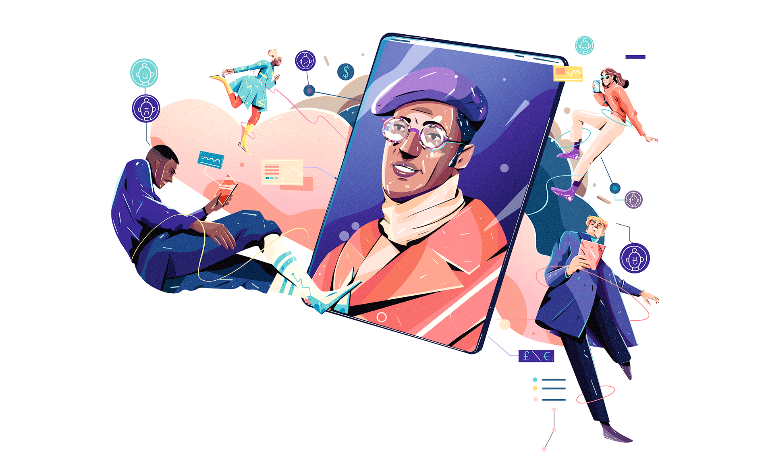
Innovation depends on interaction, however. And you can't really get that from a video call. "How do we have the water cooler conversation?" asks Blank. "There are no real good software packages like that."Although there is some evidence that the importance of proximity has gone down in the digital era – the average distance between co-applicants on patent applications has increased enormously with the popularity of the internet, according to Frey. Yet patent applications go down in the event of a conference cancelation, an indication that these distant partners and teams still meet physically to advance their work, Frey says.
Tools like Donut.com, a startup in which Blank is an investor, are trying to find virtual ways to compensate for the limitations of online connections. It aims to build trust and form friendships "by making it easy to launch virtual coffee or group lunches, encourage peers to meet for learning opportunities, and build important internal networks for new hires," according to the website. But although video is good enough for an initial call, Blank says, it would be difficult to form a team online. Blank suggests that a startup team is like a marriage: You may meet through online dating, but you will want to get to know each other in person before you tie the knot. "You could do online dating to kind of first see [if you like someone], but to establish a long-term trusting relationship, you need to have a physical component," he says.
is director of the Future of Work Programme at the Oxford Martin School and author of "The Technology Trap: Capital, Labor and Power in the Age of Automation."
Being entirely online would, in general, be difficult for teams. "You could put together a virtual team," says Blank, "but it makes trust a lot harder and it also makes problem-solving harder." Why is that? First, because online communication has a context deficit, Blank says. Second, because people tend to be a lot less careful with their words online than in person. Blank is not the only one who foresees a continuing need for physical space, despite the move to the digital sphere: Frey also believes offices and urban industrial clusters will remain important for innovation. "I think urban density has huge benefits that outweigh the cost ... innovation clusters from Renaissance Florence to Victorian Birmingham and Manchester to 20th-century Detroit to Silicon Valley and Seattle today [have always been in cities] ... knowledge-intensive industries benefit from proximity to each other."
Others have pointed to the role of proximity in innovation. Just look at UC Berkeley's AnnaLee Saxenian's analysis Regional Advantage: Culture and Competition in Silicon Valley and Route 128 for some insight on how real-world locality informs innovation, not least in its relationship to university campuses. Regardless of what might be the best way of communicating or what mix of real and virtual meeting is optimal, if you have a fresh idea that fits this particular moment, McGrath says it would be foolish to wait for better conditions. "It's a fabulous time for innovation," she says. "History suggests that bad times, downturns, are often the spark for incredible resourcefulness," she adds. "We've seen that over and over again."
"Urban density has huge benefits that outweigh the cost."
Most investors look for companies that can boast a solid balance sheet, loyal customers and secure, resilient and probably near-shore supply chains. That last bit – namely coronavirus-resistant operations and business models – might become even more important from an investment standpoint. At the same time, Blank predicts that private equity funds, still flush with cash, will be taking advantage of assets that were hurt during the lockdown but seem likely to bounce back. "I think they're going to be buying up all the people whose cash flow dropped off the cliff, but who have good long-term prospects," he says. While out in Silicon Valley, venture capitalists may be looking for more diversity in team leadership, partly a response to the awareness created as a result of the recent Black Lives Matter protests.
Things have changed a lot in Silicon Valley over the past four decades, Blank says. "Silicon Valley 40 years ago used to be white guys in boat shoes ... There truly was a glass ceiling. If you were Asian, you were possibly the VP of engineering – possibly – at least if you were in electronic design automation of semiconductors. No other business segment had Asians ... But there's no way you'd be the CEO – they'd hire some white guy." Now, he says, he expects that in the wake of the new racial awakening in the US venture capital firms will possibly earmark more money for teams led by people of color. It's a long-overdue corrective. There are other faultlines in business that could also now be corrected in the wake of post-corona shifts – an opportunity to correct problems of diversity and inequality as well as questions of sustainability.
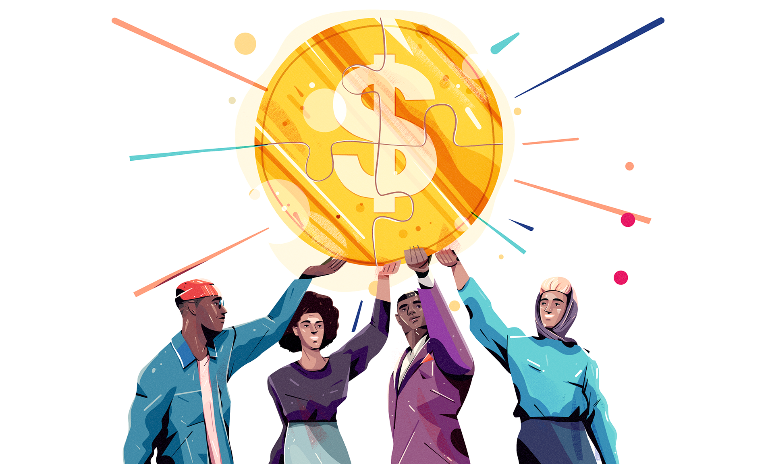
Politicians will be under enormous pressure to deliver more security for citizens who are feeling vulnerable, and this will likely translate into tougher enforcement of existing consumer protection laws and other regulations. Companies will need to think not just about what's most profitable or popular, but what can make the biggest social contribution, particularly with racial and gender inclusion now a high priority with the electorate, say Sheth and others.
Companies may feel particularly pushed if unemployment stays high. While some are predicting a bigger and better robot workforce, Frey believes that hard times could lead politicians to put the brakes on rapid automation. "We saw during the Great Depression, for example, that President Roosevelt in the National Recovery Act had certain limits on introduction of machinery in some industries," he explains, "and so it's possible that we may see some of that." In China, for instance, he adds, one poll pre-lockdown found that 27% of people favored policies that limit the adoption of new machinery to reduce job replacement. Several months later, that number has doubled and stands now at 54%.
is professor of marketing at Emory University’s Goizueta Business School and a noted corporate strategist.
One mitigating factor, and one which could either reduce policymakers' ability to act or increase their determination, could be the amount of trust the public has in their government by the time the pandemic ends. Frey suggests that trust in government may be either higher or lower depending on how well it handled its public health management during the pandemic. "Trust in government tends to see increased support during the early days of crisis management," Frey says. "And then when people realize that things haven't been going that well, trust declines very rapidly. I haven't seen any data coming out on that so far, but I would imagine that in places where the pandemic has been badly mishandled, trust in institutions might deteriorate and might also depend, to some extent, on how prominently those institutions have featured in the public discourse," Frey says. "In Sweden, for example, the Public Health Agency has been very much at the forefront of this, obviously, and they haven't handled the pandemic very well."
There is still more to be considered in the context of the post-pandemic world. "I think two issues are coming together – the pandemic and the economic pain and on the other side we've got the social inequity and the recognition that for many of our citizens this is not an economy that is very productive or forgiving," says McGrath.
The last Gilded Age, an age when robber barons were able to extract most of the value being created, took some time for the world to overcome – and even then humanity proved to be a very slow learner. "It took a union movement, a couple of world wars and a Great Depression for us to realize that it was maybe not the best way to organize a society," she says. Sheth argues that the response of big business has not been as strong as he had hoped.
Even as government agencies, NGOs and small businesses are working hard to help people hurt by the virus, "[s]itting on the sidelines and hoping for a dole-out are the large corporations, especially multinationals. It's mind-boggling!" Companies need to think about what might have been unthinkable before. Consider that going forward a successful company will need to think through more areas of alignment not only with employees, customers, investors and society, but even with competitors. If you need some inspiration here, think of pharma's unprecedented level of cooperation on a Covid-19 vaccine.
Familiar boundaries are changing, with financial pressures leading to more talk of dialing back subsidies on some industries, such as oil and gas fracking in the US, even as other governments pursue direct investments in companies pursuing certain strategic goals – for example, the surprise $340 million investment by the German government in CureVac, a vaccine startup. Nor will the need for this level of social cooperation end with a vaccine. The Covid-19 pandemic is the first truly global challenge humanity has faced in our lifetime, but most people agree it won't be the last – and maybe not even the most serious (think climate change). More than ever, management thinkers are saying, the business of business will be about much more than business.

![{[downloads[language].preview]}](https://www.rolandberger.com/publications/publication_image/TA_32_001_EN_Cover_download_preview.jpg)
Think:Act Magazine explores how successful companies face the challenges of our time with creativity and agility to enter a New World.
